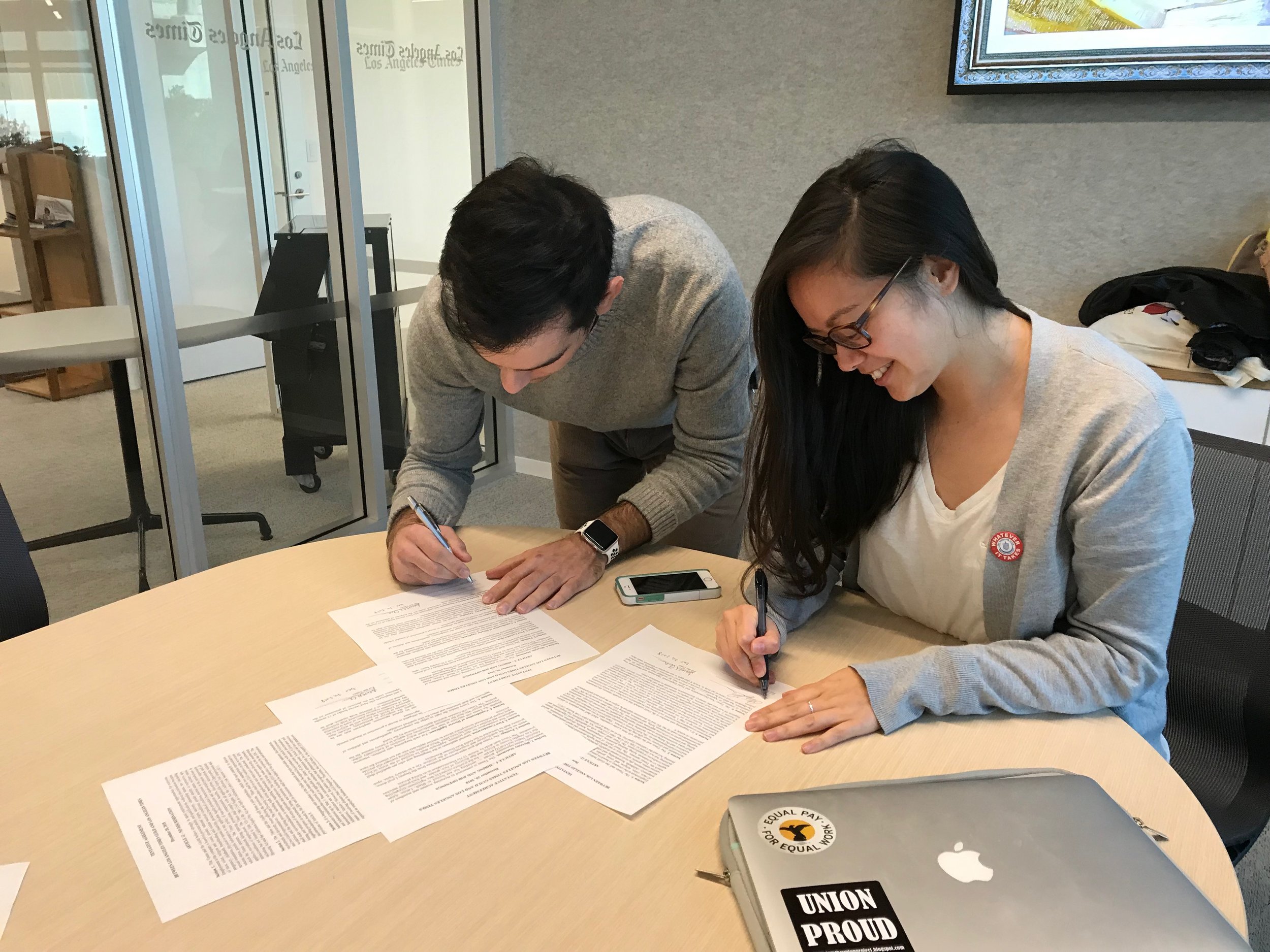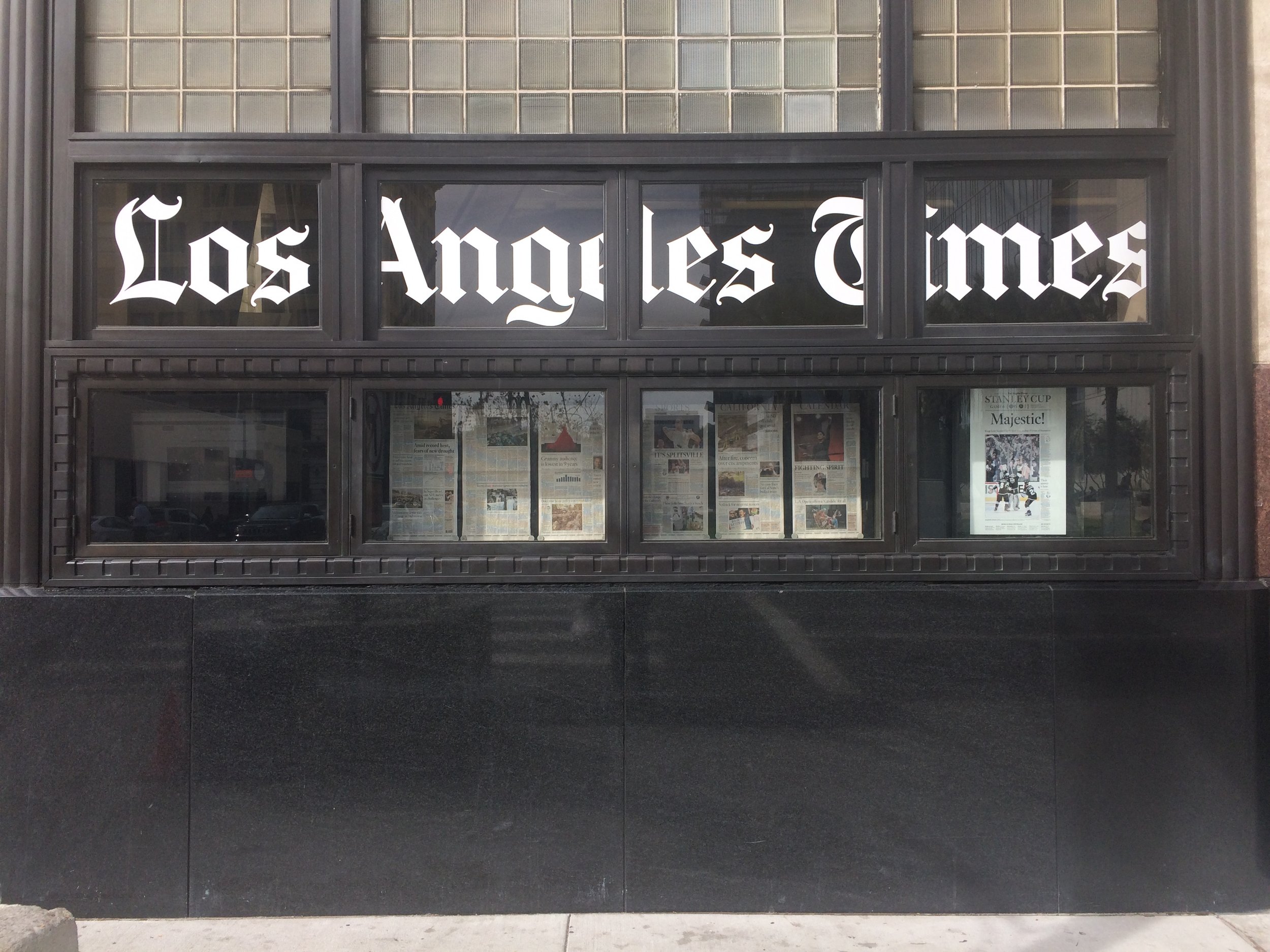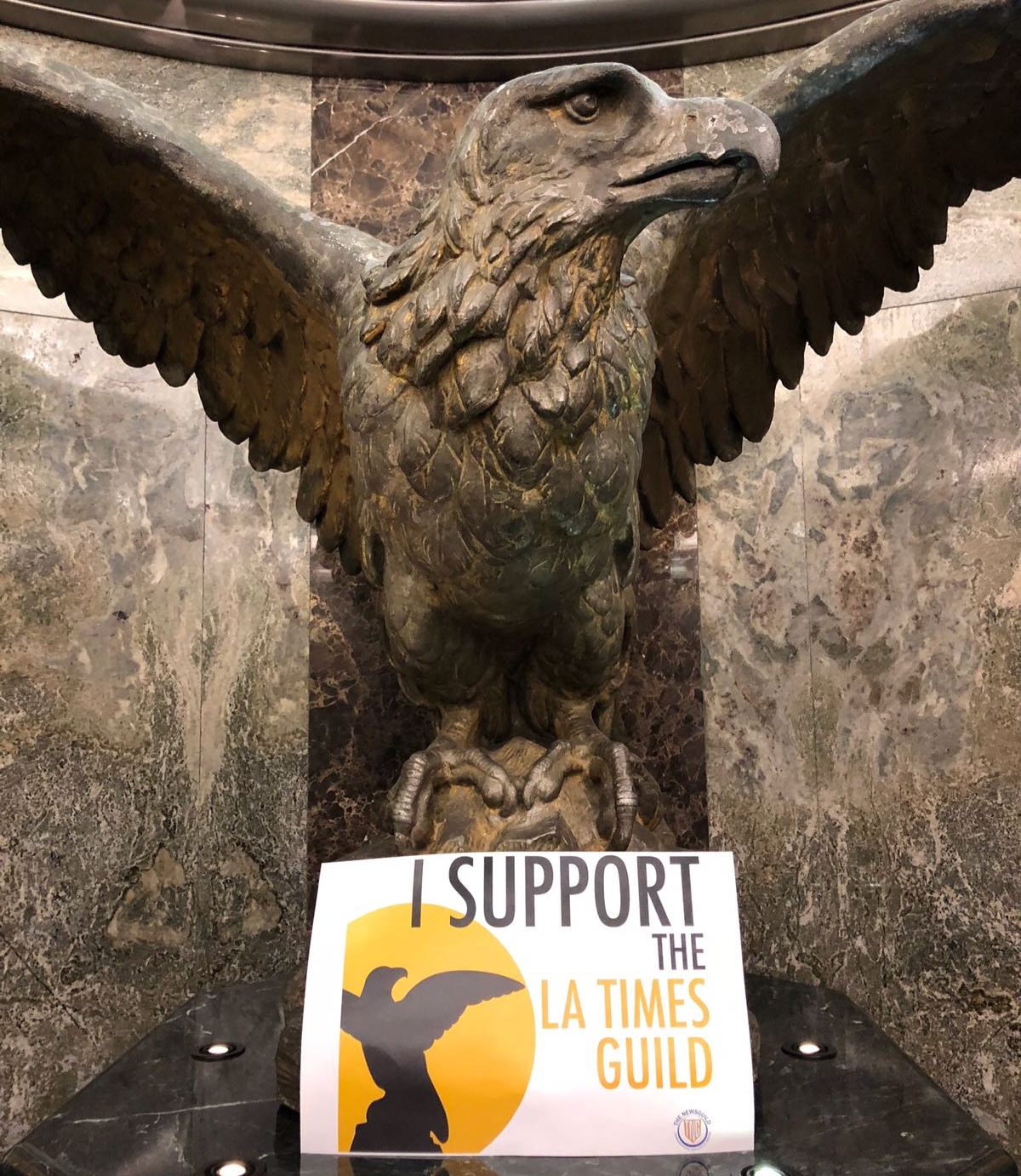We, the undersigned journalists of the Los Angeles Times, write to protest a proposed company policy on intellectual property that would mark a new low in the newspaper industry — and potentially limit our staff’s long-standing contributions to literary and creative life in the United States.
The newsroom has been bargaining in good faith with management on a first contract for months. While some disagreements remain, we’re proud to work for a publication that recognizes newsrooms need investment, not cuts, to survive.
But late in negotiations, the company has proposed a draconian policy on books and other creative projects that, as a condition of employment, would go far beyond the work-for-hire standards of U.S. copyright law and the relicensing practices historically allowed by The Times.
If we have a book idea related to our work, even if fictional, the company wants unfettered power to claim control over whether it gets written, who owns the copyright and what we might get paid for it. The company also wants to claim the film rights to such books even if the company grants permission for the book to be written, on unpaid leave, for an outside publisher.
No other newspaper has contract language this strict — not the New York Times, Washington Post or the Wall Street Journal. This is especially inappropriate, coming as it does from the Los Angeles Times, which runs the highly popular L.A. Times Festival of Books and has a proud history of employing journalists who have made significant contributions to the literary community.
Michael Connelly, the bestselling author, created the character of LAPD Detective Hieronymus Bosch while working as a crime reporter for The Times. Columnist Steve Lopez developed “The Soloist,” a close-up account of homelessness in Los Angeles, based on his work as a metro columnist; his book later became a movie starring Robert Downey Jr. and Jamie Foxx. Former reporter Sonia Nazario based her critically acclaimed book “Enrique’s Journey” on the Pulitzer Prize-winning series on Central American immigration she wrote for The Times.
If these books didn’t exist, readers everywhere would be poorer for it. But under the company's proposal, these types of projects could fall within its control — and, most disturbingly, within its power to reject wholesale. The Times should encourage its employees to be ambitious, not empower lawyers to squat on copyrights. Moreover, the company's proposal to claim control over any work created by employees "within the scope of their employment" is unworkably vague, especially given the sweeping interpretations that company negotiators gave us at the bargaining table.
This is the age of Netflix, and the company has additionally asserted "rights to use employee names, likenesses, biographical information, etc.,” without requiring any consent from us, for any creative project it chooses to pursue, while obligating us to participate in its development. It’s the sort of thing that smacks of the Hollywood studio system of the 1930s, when studio executives controlled what movies their actors appeared in and with whom. There’s a reason that system came to an end.
We’re worried that such policies would not only drive away talented recruits who might be interested in working for The Times, but it might also perversely incentivize Times journalists to quit in order to develop projects.
As the L.A. Times enters a promising new era for journalism, we fear management’s restrictive proposal will directly harm the reputation of the institution and hinder the production of important creative and journalistic works in a city with a strong history of valuing and compensating writers. The company must change course.
Signed,
Scott Martelle
Barbara Demick
Louis Sahagun
Michael Finnegan
Carolina A. Miranda
Patricia I. Escárcega
Christopher Knight
Bill Plaschke
Matt Pearce
Maria La Ganga
Chris Megerian
Mark Z. Barabak
James Queally
Joe Mozingo
Gerrick Kennedy
Bill Addison
Joel Rubin
Del Quentin Wilber
Bettina Boxall
Steve Lopez
Matt Hamilton
Robin Abcarian
Gustavo Arellano
Christopher Goffard
Brian van der Brug
Harriet Ryan
Alan Zarembo
Martina Ibanez-Baldor
Diana Marcum
Ben Oreskes
George Skelton
Michael Hiltzik
Thomas Curwen
Jeffrey Fleishman
Noah Bierman
Mark Swed
Jenn Harris
Jon Schleuss
Nathan Fenno
Jaweed Kaleem
Ben Brazil
Liam Dillon
Laura J. Nelson
Dakota Smith
Glenn Whipp
Kevin Crust
Paige Hymson
Colleen Shalby
Lauren Raab
Sarah Parvini
Mariel Garza
Jad El Reda
Evan Halper
Blake Hennon
Amy Kaufman
Steve Devol
Laura Newberry
Alexa Díaz
Jen Yamato
Nardine Saad
Andy Nguyen
Eli Stokols
David Willman
Anna Phillips
Denise Florez
Cindy Chang
Paige St. John
Joseph Serna
Jaclyn Cosgrove
Phil Willon
Cindy Carcamo
J. Brady McCollough
Paul Duginski
Luke Money
Christine Mai-Duc
Jessica Gelt
Hannah Fry
Doug Smith
Angel Jennings
Samantha Masunaga
Melanie Mason
Julia Sclafani
August Brown
Jenny Jarvie
Rong-Gong Lin II
Anthony Pesce
Makeda Easter
Alex Wigglesworth
Hugo Martin
Kristina Bui
Javier Panzar
Steve Eames
Robert Lloyd
Angela Jamison
Christopher Reynolds
Lance Pugmire
Sam Dean
Christie D’Zurilla
Jackie Calmes
Jim Puzzanghera
Sara Cardine
Andrew J. Campa
Anthony Clark Carpio
Maloy Moore
Matthew Fleischer
Betty Chavarria
Jessica Martinez
David Wharton
Janet Hook
Noam Levey
Lisa Boone
Brian Park
Carla Hall
Kevin Ueda
Emily Alpert Reyes
Jim Buzinski
Ruben Vives
Priya Krishnakumar
Doyle McManus
Bill Shaikin
Andrew Khouri
Reed Johnson
Melody Gutierrez
Andrew Greif
Lorraine Ali
An Amlotte
Kenneth Turan
Frank Shyong
Hailey Branson-Potts
Elsie Ramos
Maya Lau
Sonali Kohli
Jade Cuevas
Jason Clark
Ryan Faughnder
Judy Pryor
Bakr Muhammad
Deborah Vankin
Jan Molen
Deborah Netburn
Paul Pringle
Matt Cooper
Adam Elmahrek
Adam Tschorn
Carlos Santana
Chris Barton
Margot Roosevelt
Justin Chang
Andrea Castillo
Kim Christensen
David Montero
Alene Tchekmedyian
Vanessa Martínez
Eduardo M. Gonzalez
Faith E. Pinho
Nicole Santa Cruz
Paul Thornton
Josh Rottenberg
Mark Olsen
Gale Holland
Ashley Lee
Roger Vincent
Geoffrey Mohan
Victoria Hernandez
Tracy Brown
Allison Mann
Rubaina Azhar
Dan Santos
Carla Rivera
Mary Forgione
Richard Winton
Chris Erskine
Hamlet Nalbandyan
Raul Roa
Paul Ybarrondo
Jay L. Clendenin
Mark E. Potts
R. Marina Levario
Jazmine Ulloa
Patt Morrison
Anh Do
Kurtis Lee
Jennifer Haberkorn
Charles McNulty
Gerard Lim
Sammy Roth
Jose S. Mancia
Lucas Peterson
Allison Hong
Christina Schoellkopf
Anne Elisabeth Dillon
Rebecca Bryant
David Cloud
Stacy Perman
Marisa Gerber
Mary McNamara
Kirk D. McKoy
Kyle Kim
Daniel Miller
Lorena Elebee
Howard Blume
David Lazarus
Nita Lelyveld
Sarah Wire
Tracy Wilkinson
Molly O’Toole
Priscella Vega
Todd Martens
Mike DiGiovanna
Jeff Amlotte
Phi Do
David Savage
Scott Smeltzer
Dylan Hernandez
Brittny Mejia
Luis Sinco
Randall Roberts
Jessica Roy
Lila Seidman
Fidel Martinez
Danielle Parenteau Decker
Jeanette E. Marantos
Dorany Pineda
Suhauna Hussain
Dennis Brosterhous
Matt Ormseth
Jessica Chen
Meredith Blake
Mikael Wood
Steven Greenberg
Steve Saldivar
John Penner
Soudi Jimenez
Eduard Cauich
Sergio Burstein
Jose Mancia
Selene Rivera
Gerardo Alatriste
Helene Elliott
Jackeline Luna
Soumya Karlamangla
Andrea Roberson
Swetha Kannan
Elena Howe
Russ Mitchell
Alison Dingeldein
Dania Maxwell
Jevon Phillips
Amina Khan
Kelly Corrigan
Melissa Gomez
Sue Worrell
Dave Lewis
Kevin Leung
P.K. Daniel
Sam-Omar Hall
Kelcie Pegher
Jill-Marie Jones
Dan Woike
Jared Servantez
Nancy Rivera Brooks
Dwayne Rogers
Lee Rogers
Sean Greene
Wendy Fawthrop
Claire Hannah Collins
Yvonne Villarreal
Paul Feldman
Efrain Hernandez Jr.
Don Ragland
Dave Bowman
Victor Barajas
Johana Bhuiyan
Jessica Perez
John Scheibe
Ryan Menezes
Leila Miller
Calvin B. Alagot
Scott Wilson
Jerome Adamstein
Vincent Nguyen
Ellis Simani
Jeff Miller
Courtney Lewis
Al Seib
Jorge Castillo
Agnus Dei Farrant
Taryn Luna
Kerry Cavanaugh
Jack Dolan
Wendy Lee
Robert Greene
Jim Brooks
Tim Berger
Michael McGough
Robert Gauthier
Melissa Etehad
Michael A.W. Ottey
Randy Lewis
Richard Marosi
Sonaiya Kelley
Iris Lee
Alejandra Reyes-Velarde
Melody Petersen
Matt Stiles
Andrew T. Turner
Hillary Davis
Tony Barboza
Rosanna Xia
David Ng
Victoria Kim
Esmeralda Bermudez
Anita Chabria
Ben Poston
Susanne Rust










